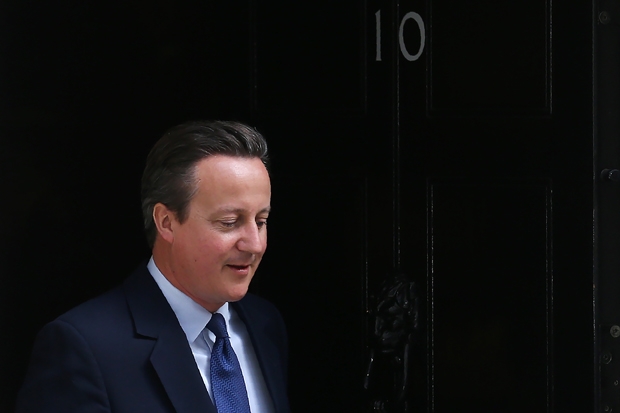Midway through his final cabinet meeting, David Cameron realised — with some horror — that it had turned into a political wake. Theresa May had just lavished praise upon him, and his eyes had moistened. Then it was George Osborne’s turn: the Chancellor was a bit more humorous, but no less affectionate: ‘Being English, David, you’ll hate all this praise,’ he said. ‘You’re quite right,’ Cameron replied. ‘I am English, and I don’t much like it.’ Fearing that every member of his government was about to deliver an elegy, he brought the meeting to an abrupt end.
Defining Cameron’s legacy is an important task for the Conservatives if they are to build on it. The current implosion of the Labour party, for example, can be traced to Labour’s failure to manage the transition after Tony Blair’s premiership ended. When Gordon Brown entered No. 10, he set about dismantling the Blair legacy of public sector reform. His vindictive destruction of any serious New Labour achievement, in an attempt to make his own mark, ended up hollowing out his party. It led first to the promotion of the vacuous Ed Miliband and next to Jeremy Corbyn — and to the chaos Labour is now in.
Theresa May had no rivalry with David Cameron, so the Prime Minister has no need to take a wrecking ball to her predecessor’s achievements. But if the Conservatives are to build on these, they must first identify them. Mr Cameron, like all politicians, cannot be trusted to do it himself. Like all former prime ministers, he wants to be remembered for his pet projects. But also like all prime ministers, his greatest successes emerged from policies he didn’t expect to be quite so effective — while many of his grandest ideas ran aground.
The first year of Conservative majority government has taught us that Cameron was at his best when governing in coalition. Perhaps his greatest achievement was the selection and management of a talented team — and allowing them to get on with it. Under Cameron, No. 10 was not pulling all the strings of government. The action was dispersed to different power bases: Michael Gove’s school reforms; Iain Duncan Smith’s welfare reforms. In the Blair years, journalists used to call No. 10 to find out what was happening in the government. Under Cameron, No. 10 aides called journalists for the same reason.
Cameron’s notorious ‘chillaxing’ style did entail a lack of attention to detail that eventually was his undoing. But his ability to devolve — and to stick by his ministers, rather than sack them, when things got tough — was responsible for the extraordinary achievement of his six years in power. His last visit as Prime Minister was to one of the free schools that are known as Gove’s legacy rather than Cameron’s. But that school — in Hounslow, west London — is only there because Cameron hired the right man to do the right job and lent his support when it was needed. That is a rare and effective form of political leadership. Cameron was not an originator of great ideas, but he was an excellent employer of great ideas — and that is more important.
His obstinacy also led him to defy conventional fiscal wisdom: to cut 440,000 public sector jobs at a time when many argued that this would create a Keynesian-style paradox of thrift, and lead to far greater unemployment. As so often, the neo-Keynesians were confounded — six private-sector jobs were created for every public-sector job axed by government. While the rest of Europe responded to the economic crisis by imposing greater regulation on business, Cameron embarked on significant deregulation. Crucially, he made it far harder for employers to be taken to a tribunal over spurious claims. He offered £2,000 reductions on National Insurance bills for small businesses. He cut corporation tax. He created incentives for companies to hire staff.
And hire they did. The jobs miracle — 31.6 million jobs in all, more than at any point in British history — has yet to be properly understood. Cameron leaves office at a time when the employment rate is the highest ever recorded, at 74.2 per cent. Supply-side and labour market reforms had a greater potency than anyone expected; this is perhaps the greatest single lesson of the post-crash era. As Mrs May openly contemplates interfering with businesses, telling them who they must appoint to their boards, she should remember the rich economic and social dividend from Cameron’s restraint in office.
Income inequality fell under Cameron because tax cuts were focused on the low-paid and welfare was reformed to encourage people to escape poverty through work. Where Cameron sought to meddle, it usually ended in a U-turn and ignominy. When he forced government back, his boldness was rewarded. At its best, his premiership was rooted in a fundamental faith in the courage and character of the British people.
Britain’s prosperity became a magnet for the world’s newly mobile workers, creating an immigration problem that Cameron was unable to solve. It also created the conditions for Brexit: a momentous vote of national self-confidence and the greatest-ever popular endorsement of the project of the United Kingdom. Theresa May takes over at a remarkable juncture in history, when Conservatism is ready for its next stage. Her premiership should aim to move away from past mistakes — as all governments do. But it must also be based on a frank acknowledgment of what Cameron got right.






Comments